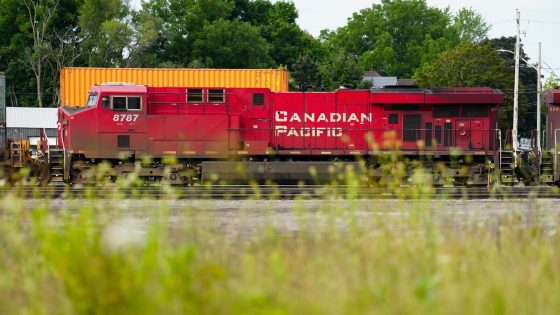TORONTO — Business and consumers throughout Canada and the U.S. could suffer significant economic harm after Canada’s major freight railroads came to a full stop Thursday because of a contract dispute with their workers.
Canadian government officials met urgently to discuss the shutdown. Canadian National and CPKC railroads both locked out their employees after the 12:01 a.m. EDT deadline Thursday passed without new agreements with the Teamsters Canada Rail Conference, which represents about 10,000 engineers, conductors and dispatchers. Contract talks were set to resume later Thursday morning.
All rail traffic in Canada and all shipments crossing the U.S. border have stopped, although CPKC and CN’s trains continue operating in the U.S. and Mexico.
Billions of dollars of goods move between Canada and the U.S. via rail each month, according to the U.S. Department of Transportation. Many companies across all industries rely on railroads to deliver their raw materials and finished products, so without regular rail service they may have to cut back or even close.
Both railroads have said they would end the lockout if the union agrees to binding arbitration. The head of the Teamsters Canada Rail Conference blamed the railroads for the lockout in a post to X Thursday morning as bargaining was set to resume.
“They are now holding the Canadian economy hostage to try and pressure the liberal government to impose final binding arbitration and take your rights away to free collective bargaining,” said union president Paul Boucher.
Business groups have urged the government to intervene, but Prime Minister Justin Trudeau declined to immediately force the parties into binding arbitration for fear of offending the Teamsters Canada Rail Conference and other unions.
Canadian Minister of Public Services and Procurement Jean-Yves Duclos urged both sides to resolve their differences.
“They need to do their job to come to an agreement quickly,” he said at a news conference.
Canadian Labor Minister Steven MacKinnon had meetings scheduled “all day on this extremely important matter,” according to a statement from MacKinnon’s office.
“The rail shutdown at CN and CPKC is already costing workers, transit users and businesses across the country, and we cannot afford to let things get worse,” Ontario Premier Doug Ford posted on X. “Both the employers and union leadership should get back to the table at once so they can reach a fair deal to end this.”
Business leaders fumed over the lack of government intervention.
“When you completely shut down the coast-to-coast supply chain, nothing good can come from that,” said John Corey, president of the Freight Management Association of Canada. “This is infuriating. People are going to lose their jobs. There is going to be a real hardship to the economy.”
Most businesses will probably have enough supplies on hand and enough room to store their finished products to withstand a brief disruption. But ports and other railroads will quickly become clogged with stranded shipments that Canadian National and CPKC won’t pick up.
Edward Jones analyst Jeff Windau said the biggest problems will start if the lockout drags on, but many companies will likely be able to withstand a short disruption partly because of changes they made to their supply chains after the pandemic.
Most previous Canadian rail stoppages have only lasted a day or two and usually involved only one of the big railroads, but some have stretched as long as eight or nine days. Pressure for government intervention will increase as the lockout continues, with the impact magnified because both railroads are stopped.
“They are so integrated and tied into the economy — just the breadth of products that they haul — they touch all aspects,” Windau said. “Ultimately, I think we need the rails to continue to be running. And so at some point the government will start to get involved more.”
Chemical businesses and food distributors will be among the first to be affected. The railroads stopped accepting new shipments of hazardous materials and perishable goods as they began gradually shutting down last week.
The auto industry also may see problems quickly because it relies on just-in-time shipments to dealerships, with significant cross-border deliveries of engines, parts and finished vehicles.
For Union Pacific, one of the U.S. rails that regularly hands off shipments to and from the Canadians, the stoppage “means thousands of cars per day will not move across the border,” the company said in a statement Thursday.
“Everything from grain and fertilizer during the critical summer season, and lumber for building homes could be impacted,” the company said.
More than 30,000 commuters in Vancouver, Toronto and Montreal were the first to feel the pain of the lockouts. They had to scramble Thursday morning to find a new way to work because their commuter trains aren’t able to operate while CPKC is shut down.
CN had been negotiating with the Teamsters for nine months while CPKC had been trying to reach an agreement for a year, the unions said.
The U.S. also faced the threat of a widespread rail shutdown two years ago, but the Biden administration forced all the rail unions to accept a contract despite their concerns about demanding schedules and the lack of paid sick time.
The Canadian negotiations are stuck on issues related to the way rail workers are scheduled and concerns about rules designed to prevent fatigue and provide adequate rest to train crews. Both railroads had proposed shifting away from the existing system, which pays workers based on the miles in a trip, to an hourly system that they said would make it easier to provide predictable time off. The union said it doesn’t want to lose hard-fought fatigue protections.
The railroads said their contract offers have included raises consistent with recent deals in the industry. Engineers make about $150,000 a year on Canadian National while conductors earn $120,000, and CPKC says its wages are comparable.
___
Funk reported from Omaha, Nebraska.
Source Agencies




